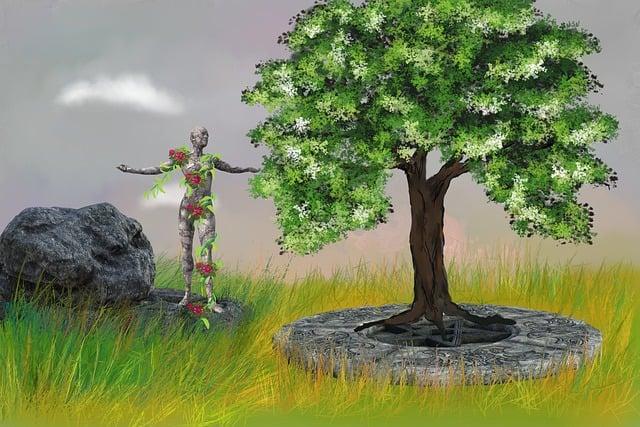In the realm of political discourse, the concept of “James Lovelock democracy” emerges as a thought-provoking and innovative approach to governance. Steering away from conventional norms, this ideology challenges the traditional structures of democracy, inviting us to ponder alternative models for a more sustainable and efficient system. Let’s delve into the depths of this intriguing concept and explore its implications for the future of governance.
Table of Contents
- Exploring James Lovelock’s Views on Democracy
- The Role of Gaia Theory in Lovelock’s Perspective
- Challenges to Traditional Democratic Systems
- Proposing Sustainable Solutions for a Future Democracy
- Q&A
- Closing Remarks
Exploring James Lovelock’s Views on Democracy
James Lovelock’s unconventional perspectives on democracy provoke thought and debate among scholars and enthusiasts alike. His deep-seated belief in the interconnectedness of all living beings extends to his views on governance and societal structures.
In Lovelock’s eyes, democracy should mirror the intricate web of life on Earth, where each element plays a crucial role in maintaining balance. His advocacy for a more holistic democracy challenges traditional notions and calls for a systemic shift towards a more harmonious way of governing.
| Key Point: | Lovelock emphasizes the importance of viewing democracy through an eco-centric lens, emphasizing mutual respect and cooperation. |

The Role of Gaia Theory in Lovelock’s Perspective
Within James Lovelock’s perspective, the Gaia Theory plays a pivotal role in shaping our understanding of the interconnectedness of the Earth’s systems. This theory proposes that the Earth functions as a self-regulating organism, maintaining conditions suitable for life.
By acknowledging the Gaia Theory, Lovelock emphasizes the importance of environmental harmony and balance. This perspective encourages us to view the Earth as a living entity, fostering a deep sense of respect and stewardship towards our planet. Understanding the intricate relationships between various components of the Earth system is key to creating sustainable solutions for the future.

Challenges to Traditional Democratic Systems
One of the primary challenges facing traditional democratic systems is the growing disconnect between elected representatives and the general populace. With the rise of special interest groups and powerful lobbying efforts, the voices of ordinary citizens often get drowned out in the political arena. This imbalance can lead to policies that do not necessarily reflect the true needs and desires of the people, undermining the core principles of democracy.
Moreover, the rapid advancement of technology poses a significant challenge to traditional democratic processes. Issues such as online disinformation, election hacking, and privacy concerns have raised serious doubts about the integrity of electoral systems. Ensuring fair and transparent elections in the digital age requires innovative solutions and robust cybersecurity measures to protect the democratic underpinnings of society.

Proposing Sustainable Solutions for a Future Democracy
Exploring the concept of sustainable democracy brings to light the interconnectedness of environmental preservation and political systems. James Lovelock’s visionary perspective invites us to rethink how we approach governance in the context of a rapidly changing world. Embracing his ideas can pave the way for a more harmonious and resilient future.
Key elements of a sustainable democratic model inspired by Lovelock’s principles include:
- Empowering Local Communities: Fostering grassroots involvement in decision-making processes.
- Integrating Scientific Insights: Incorporating scientific knowledge into policy formation for evidence-based governance.
- Promoting Long-Term Thinking: Encouraging forward-looking initiatives that address both current and future needs.
Q&A
Q: Who is James Lovelock and what is his connection to democracy?
A: James Lovelock is a renowned scientist, environmentalist, and futurist known for his Gaia hypothesis, which posits that the Earth functions as a self-regulating system. While Lovelock’s work is primarily focused on the environment, his views on democracy are also significant. He suggests that traditional democracy may be ill-equipped to handle the global challenges we face today, advocating for a more technocratic approach to governance.
Q: How does James Lovelock’s perspective on democracy differ from conventional views?
A: Unlike traditional democratic principles that emphasize majority rule and political decision-making, Lovelock proposes a model where informed experts have a more prominent role in shaping policies. This technocratic view prioritizes scientific expertise and long-term sustainability over short-term political gains.
Q: What are the potential implications of adopting a more technocratic approach to governance, as advocated by James Lovelock?
A: Embracing a technocratic governance model could lead to more evidence-based policy decisions, greater focus on addressing global environmental challenges, and potentially more efficient responses to complex issues. However, critics argue that such a system may lack the necessary checks and balances to prevent abuses of power.
Q: How can James Lovelock’s ideas on democracy influence current political discussions and policies?
A: Lovelock’s unconventional views on democracy serve as a thought-provoking contribution to ongoing debates about the future of governance. By challenging traditional notions of democracy, his work prompts us to reconsider how we approach decision-making processes, particularly in the face of complex, interconnected global issues.
Closing Remarks
In a world where democracy and environmental consciousness intersect, the ideas of James Lovelock stand as a beacon of contemplation. As we delve into the intricate relationship between governance and the health of our planet, Lovelock’s perspective offers a unique lens through which to view our collective future. Whether one agrees or challenges his views, the discourse sparked by Lovelock’s thoughts is a vital part of shaping our societal dialogue. As we navigate the complex landscape of political systems and environmental challenges, may the legacy of James Lovelock remind us of the delicate dance between humanity and the Earth we call home.



0 Comments